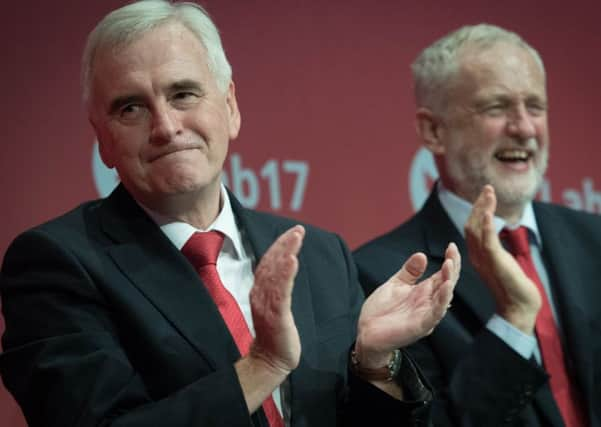Jayne Dowle: Labour bashes fat cats, but will it help us?


I grew up in the 1970s in a South Yorkshire town renowned for fierce trade unions and old-fashioned Labour values. Beneath the conference rhetoric, I recognise where these radical policies are coming from. They have historical value, an attempt to return the party to its members and supporters and to formulate public plans which outlaw the claw of capitalism.
They are also a serious statement of intent, a reminder – as if one was needed – to the moderates that they are no longer in charge. It is almost a quarter of a century since Tony Blair used his first speech as party leader to ditch Labour’s commitment to nationalisation.
Advertisement
Hide AdAdvertisement
Hide AdIn his own conference speech this week, Shadow Chancellor John McDonnell announced that the principles of Clause IV, Labour’s commitment to public ownership drawn up in 1918, were “as relevant as they were back then. Fair, democratic, collective solutions to the challenges of the modern economy”.
“I believe it’s time,” he reiterated. “It’s time to shift the balance of power in our country. It’s time to give people back control over their lives.”
I’m still not feeling the love. Rather than the empowerment leader Jeremy Corbyn seeks to offer, all I have is a queasy sense of unease.
Advertisement
Hide AdAdvertisement
Hide AdAs the Shadow Chancellor made public ownership the keystone of his speech, Corbyn followed up with a vow to transform the energy industry and quash capitalism.
It was stirring stuff, if you happen to support McDonnell and Corbyn and agree with their strident programme of nationalisation, which would also cover rail companies and the Royal Mail. Corbyn’s message was to reassure party members and voters that Labour would look after them.
From where I stand, as an ordinary voter, consumer and bill-payer, it did anything but. Why pick on water first, when public transport is an issue which surely chimes more loudly with the millions of workers who suffer daily from catastrophic rail services?
I would have liked to have heard much more detail about how Labour might go about joining up our disjointed train companies and doing something about the eye-watering fares sending a lot of those workers into debt.
Advertisement
Hide AdAdvertisement
Hide AdAnd, as they’re keen on getting councils involved in their nationalisation plans, why not talk to us about how bus services could be supported by local government? I’m sure that voters in rural areas would be very interested to hear their thoughts on how vital services could be reinstated to save their communities from withering and dying.
Everything I heard about what McDonnell calls “economic democratic rights” was a big, broad brush stroke that didn’t really address the concerns of mainstream voters. Do these people listen to anyone but themselves?
Have they heard of online comparison sites? Don’t they realise that actually, these days, the real power is with the consumer? If we don’t like the prices and services of a certain utility firm, we’re within our rights to terminate our agreement and find another one.
I’ve done it many times. Indeed, I think the only one I haven’t swapped in recent years is Yorkshire Water. And even I can’t find anything to complain about there. Our regional supplier is the most efficient and friendliest of all the utility companies I use.
Advertisement
Hide AdAdvertisement
Hide AdI’ll tell you what the point is, and it has little to do with making life nicer for you and me. A joint investigation by the GMB union and Corporate Watch found that Richard Flint, the chief executive of Yorkshire Water, earned £1.3m last year through his salary, bonuses, pensions and other benefits.
Don’t be fooled. It’s people like him that McDonnell and Corbyn are after, their mission to quash the so-called “fat cats” dressed up as a crusade to improve our daily lives.
Carolyn Fairbairn, the director general of the CBI, is right. She says that rather than bring positive benefits, Labour’s plans would result in lower living standards for all.
And from what I’ve heard from the stage in Liverpool this week, I’d also say that these plans for nationalisation also display a wilful misunderstanding of what ordinary voters might actually want. This is potentially much more damaging.